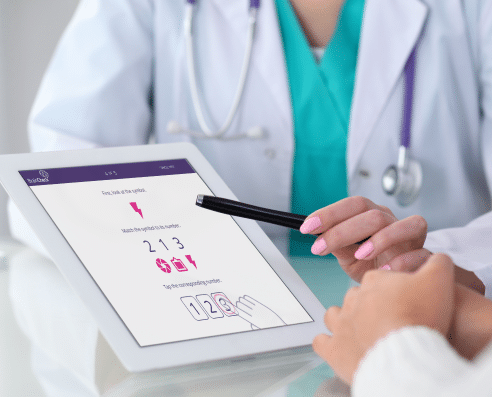Digital health funding declines for the third year in a row
AI-enabled digital health startups raised $3.7B, 37% of total funding for the sector
Read more... More than 7 million Americans are unaware they have mild cognitive impairment (MCI) and without intervention nearly 30% of these patients could go on to develop dementia or Alzheimer’s. On top of that, recent studies have shown that Alzheimer’s Disease can start 15 to 25 years before individuals start showing symptoms, and diagnosis is often substantially delayed. As a result, 60 to 75% of adults with the disease never receive a formal diagnosis or are diagnosed at more advanced stages of dementia.
More than 7 million Americans are unaware they have mild cognitive impairment (MCI) and without intervention nearly 30% of these patients could go on to develop dementia or Alzheimer’s. On top of that, recent studies have shown that Alzheimer’s Disease can start 15 to 25 years before individuals start showing symptoms, and diagnosis is often substantially delayed. As a result, 60 to 75% of adults with the disease never receive a formal diagnosis or are diagnosed at more advanced stages of dementia.
Meanwhile, the tests that are being performed are under diagnosing MCI, and they're outdated, cumbersome and impractical, Kim Rodriguez, CEO of digital cognitive assessment platform BrainCheck, which announced a $15 million new financing round on Tuesday, told VatorNew.
"Traditional cognitive tests also typically require about 15 minutes, making it a challenge for clinicians to conduct them in the 18 minutes they typically spend with each patient. Navigating next steps following diagnosis can also pose a challenge for patients, caregivers and providers," she said.
"As our population ages, prevalence of the disease is rapidly growing, and is set to double by 2050. This could place significant strains on healthcare resources such as hospitals, long-term care facilities, and community support services. This surge in demand for specialized care could also lead to longer wait times for diagnosis and treatment, impacting overall healthcare accessibility."
BrainCheck’s platform is designed to help streamline screening, assessment, care planning, and monitoring.
One of its products its BrainCheck Screen, which helps providers determine whether further cognitive testing may be needed with BrainCheck’s standard battery, Assess, in as little as three minutes. Assess is a FDA Class II medical device that detects signs of cognitive impairment, which may have association with dementias including Alzheimer’s; it can evaluate five cognitive domains in just 10 to 15 minutes.
The company also offers BrainCheck Plan, which helps clinicians build, document, and deliver a care plan for patients with cognitive decline, post-diagnosis that are personalized to preserve and manage brain health over time. Data collection is streamlined into modules for patients, providers, and caregivers.
The platform is integrated into the athenahealth Marketplace, the largest electronic health record (EHR) app store, allowing clinicians to deploy cognitive care anytime and anywhere, on any device, with instant access to results accessed directly in their EHR.
"BrainCheck is committed to playing a pivotal role in promoting, protecting, and preserving brain health. We believe it’s time to overcome the challenges of identifying cognitive issues and bridge the gap between prevalence and diagnosis. Because maximizing the window of intervention for cognitive impairment empowers providers and patients with more options and opportunities to preserve brain health," said Rodriguez.
"Our vision is to lead a fundamental shift in how cognitive care is delivered by offering a platform that is convenient, user-friendly, and accessible. With dementia projections on the rise, our goal is to empower clinicians with clinically proven technology to intervene sooner and combat cognitive decline, ultimately making cognitive care more proactive and personalized."
Currently, BrainCheck is used by hundreds of providers and specialists, and its platform has been used by more than 450,000 patients and their families.
The new funding round was led by Next Coast Ventures, S3 Ventures, and UPMC Enterprises, the innovation, commercialization, and venture capital arm of UPMC. The company says it will use the money to accelerate its commercial traction, expand innovation within its product portfolio, build upon existing clinical evidence, and extend its impact throughout the healthcare landscape, including major integrations with healthcare systems.
"We are leaning into the commercial opportunity to close the cognitive care gap with HCPs, healthcare systems, and key partners in the ecosystem, transforming our company from more of a single-practice business to a widespread enterprise business. We do that by showing tangible value and outcomes, providing an end-to-end approach with our toolset, and making it easy for providers and healthcare systems with seamless integrations," Rodriguez explained.
In conjunction with the funding, it was also announced that Nicholas Shapiro, Vice President, UPMC Enterprises, has joined the board of directors at BrainCheck.
"Nick brings invaluable experience to our Board; his insights and expertise align well with our vision to fundamentally shift how cognitive care is delivered. The expansion of our Board reflects our commitment to strategic leadership and leveraging diverse perspectives to guide our growth," said Rodriguez.
Going forward, the company will remain focused on commercializing and scaling a digital cognitive assessment platform that is clinically robust, easy for patients and their caregivers to use, enables a simplified provider experience, and improves access to the actionable information needed to intervene sooner and potentially combat cognitive decline.
Meanwhile, the market is experiencing strong tailwinds, with the advancement of disease modifying therapies, such as the FDA approval of Leqembi last summer and pending approval of donanemab, Rodriguez explained.
"Early detection is now more important than ever, and BrainCheck is at the center of it. With the strong BrainCheck foundation we have built, combined with our next-generation platform, we are poised to capitalize on the momentum and transform the way cognitive care is delivered for years ahead," she said.
(Image source: braincheck.com)
AI-enabled digital health startups raised $3.7B, 37% of total funding for the sector
Read more...OXcan combines proteomics and artificial intelligence for early detection
Read more...Nearly $265B in claims are denied every year because of the way they're coded
Read more...